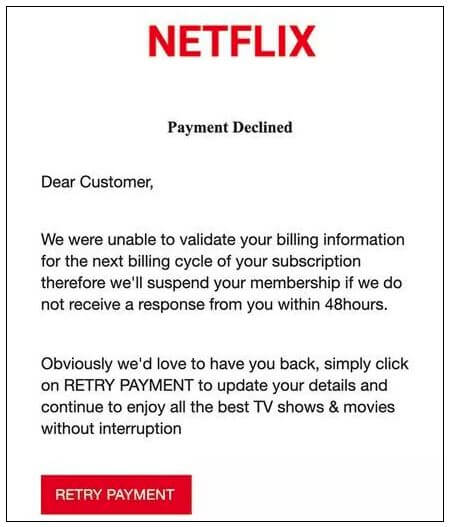Phishing scams aimed at Netflix customers have been prevalent for years, and the aftermath of falling prey to one is still quite severe. Not only could you lose access to your beloved Netflix account (oh, the horror!), but more alarmingly, you could unknowingly divulge sensitive details like your address, phone number, and even credit card information.
Example of a Netflix phishing email
Here's a prime example of a cunning Netflix phishing email.

The email states: “We were unable to validate your billing information for the next billing cycle of your subscription therefore we’ll suspend your membership if we do not receive a response from you within 48 hours.”
Clicking on the link will redirect you to a deceptive webpage specifically crafted to extract your personal information. As is the case with numerous phishing emails, there are several warning signs that indicate the message is fraudulent.
The phrase "Payment Declined" stands out due to its distinctive font and size, creating a visual contrast with the rest of the email content.
Additionally, the email contains noticeable grammar and spelling mistakes. For example, it states "48hours" without a space, there is a missing period at the end of the second paragraph, and the words "RETRY PAYMENT" are not properly enclosed in quotation marks. These errors raise red flags and indicate that the email is likely a phishing attempt.
It is important to never update your financial information in response to an email request. Netflix has made it clear that they will never ask for your personal details through texts or emails. This includes sensitive information such as credit or debit card numbers, bank account details, and Netflix passwords.
How can you spot a Netflix scam email?
These guidelines are not only applicable to phishing emails pretending to be from Netflix, but also to other potential phishing emails.
If you ever find yourself doubting the true intentions of an email, consider asking yourself the following questions:
- Is the email address of the sender legitimate and representative of the website it claims to be from (e.g. Netflix.com)?
- Are there any noticeable errors in grammar or spelling?
- Does the email seem to have an ulterior motive, such as requesting private and valuable information like credit card details or social security numbers?
- Does the email read as if it were not written by a native English speaker?
- Was the email crafted to create a sense of panic, pressuring you to act quickly or risk losing access to your Netflix account?
- Is the web page link you are redirected to hosted on a suspicious domain name (e.g. walmart832.info instead of walmart.com)?
- Is there a suspicious attachment accompanying the email?
If you ever receive one of these emails, it is important to refrain from clicking on any links. Instead, delete the email and block the sender. Report the message to Netflix, your email service provider, and your IT administrator. Lastly, ensure that you are following password best practices to strengthen your online security.






